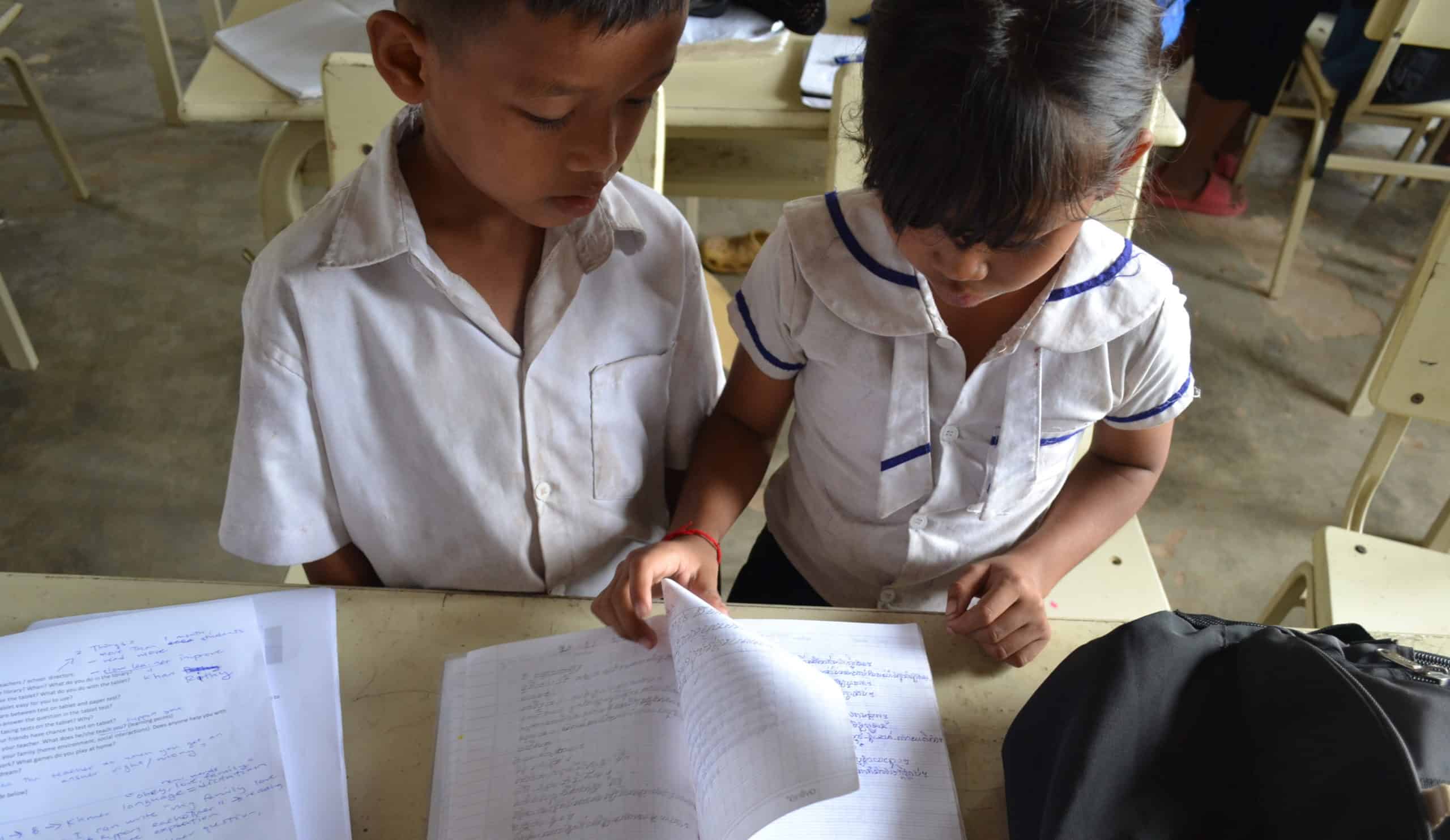Empowering Teachers in Cambodia
Through the McGovern-Dole Food for Education program, World Education is improving literacy in Cambodia by providing training and support to primary school educators and administrators.
To improve children’s reading skills, World Education is strengthening instructional approaches and distributing teaching and literacy learning materials used in more than 500 schools across Siem Reap and Kampong Thom provinces in Cambodia. When teachers are supported and have the tools and resources they need in the classroom, their students thrive.
World Education is training more than 2,000 teachers and librarians on early literacy and child development, equipping classrooms with thousands of learning and teaching materials, and building the capacity of government teacher education providers, school leaders, and officials to strengthen and support teachers’ ongoing professional development at all stages system-wide.
Improving the teacher experience through technology
These videos feature Cambodian teachers modeling new early grade literacy techniques with students in rural primary school classrooms. Classroom video examples are provided throughout training sessions in order to bring activities, learning tools, and teaching concepts to life. For educators at rural schools with limited resources, the videos are motivational and a helpful tool. As well as providing a visual model of a new technique, they offer concrete evidence to teachers that new techniques such as pupil-led reading can and do work in regular Cambodian classrooms, and can be done by teachers such as themselves.
The videos are part of a teacher training curriculum to prioritize early literacy and teacher training reforms in Cambodia. The trainers use pocket projectors and speakers to show these videos during trainings, and the teachers are provided with the YouTube links so they can view them again at other times, allowing participants to access content outside of trainings and deepen their understanding of concepts through self-paced learning. The links are included in all training materials and as links on “How-To-Cards” distributed to all schools.
Creating a culture of literacy
At a rural primary school in Angkor Thom District of Siem Reap Province, students and teachers are embracing the new techniques in the classroom.
For seven-year-old Sreypov, learning to read has strengthened her confidence. Although she is the youngest student in her grade 3 class, she is a leader in the classroom and plans to become a teacher when she gets older.
 Sreypov’s teacher, Ms. Tep, has been participating in trainings with World Education and incorporating what she has learned in the classroom. She is proud to see that her teaching style is helping Sreypov with reading.
Sreypov’s teacher, Ms. Tep, has been participating in trainings with World Education and incorporating what she has learned in the classroom. She is proud to see that her teaching style is helping Sreypov with reading.
“Sreypov has improved a lot over the last year,” Ms. Tep said. “Other learners have also improved, and in the last month, I’ve noticed that more students are reading during the break time.”
Storybooks provided by the Food for Education project attract student interest and mats provide a comfortable learning space for reading. Additionally, Ms. Tep appreciates teacher trainings because “a lot of the literacy games align with my lesson plan and keep students engaged and on task.”
With support from World Education, young learners like Sreypov are improving their self-confidence, language and literacy skills, while teachers are learning how to create a fun, supportive, and student-centered learning experience for their students.
Vision and impact
Educators and students alike are benefiting from additional training and support. To date, over 70% of school directors have demonstrated application of new skills and tools to support teacher professional development at their schools Additionally, among a sample of over 250 schools, 63% of teachers demonstrated that they have applied new skills and methodologies as a result of the teacher training.
More broadly, World Education has applied its expertise in early learning and literacy with projects across Cambodia. Working in partnership with government and local groups, World Education strengthens the quality of education through curriculum development, teacher education, innovative mobile learning apps, improved school governance through stakeholder-driven development and capacity building for teachers, school leaders, education officials, policy makers, parents and community members and. In 2017, World Education reached 75,000 students with literacy interventions in Cambodia.
The McGovern-Dole Food For Education (FFE) project is a three-year program supported by the U.S. Department of Agriculture to improve food security and enhance learning outcomes in Cambodia. World Education works in collaboration with the World Food Programme, Kampuchean Action for Primary Education (KAPE), and Cambodian Ministry of Education, Youth and Sport (MoEYS).
To learn more about this project and World Education’s literacy expertise in Cambodia, please visit cambodia.worlded.org.
You can also read more about World Education’s efforts for scaling education technology to improve early grade literacy in Cambodia in a recent blog article from All Children Reading.
